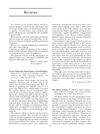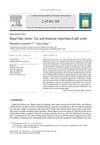 1 citations,
January 2010 in “Elsevier eBooks”
1 citations,
January 2010 in “Elsevier eBooks” Follicular Unit Hair Transplantation is a method for restoring hair by transplanting individual hair follicles.
 37 citations,
June 2011 in “Journal of Cellular Biochemistry”
37 citations,
June 2011 in “Journal of Cellular Biochemistry” Androgen is important in controlling stem cell differentiation, reducing fat development, and increasing lean mass.

Hair follicle stem cells are crucial for touch sensation and proper nerve structure in mice.
[object Object]  34 citations,
January 1998 in “European Urology”
34 citations,
January 1998 in “European Urology” Finasteride works best in 6 months and lasts 6 years.
 3 citations,
June 2009 in “Journal of The European Academy of Dermatology and Venereology”
3 citations,
June 2009 in “Journal of The European Academy of Dermatology and Venereology” Sparse hairs below frontal hairline can indicate early male balding.
 2 citations,
November 2002 in “Dermatologic Surgery”
2 citations,
November 2002 in “Dermatologic Surgery” The authors' 10-year experience shows that a personalized approach to hair restoration surgery, using various techniques, leads to natural results and high patient satisfaction.
 97 citations,
March 2009 in “Dermato-endocrinology”
97 citations,
March 2009 in “Dermato-endocrinology” Hormones significantly affect hair and oil gland function in the skin, and more research is needed on skin-related hormone disorders.
 1 citations,
February 2009 in “Journal of The American Academy of Dermatology”
1 citations,
February 2009 in “Journal of The American Academy of Dermatology” Children's Serum Sickness-Like Reaction is often linked to antibiotics, especially amoxicillin, and involves symptoms like rash, fever, and joint issues.
 April 2023 in “Authorea (Authorea)”
April 2023 in “Authorea (Authorea)” Hair transplantation can improve scars after removing a rare skin cancer.
[object Object]  February 2000 in “Plastic and Reconstructive Surgery”
February 2000 in “Plastic and Reconstructive Surgery” The "Color Atlas of Hair Restoration Surgery" is a clear, practical guide for hair restoration procedures, covering topics like flaps, grafts, and planning, and is known for its helpful photos.
 10 citations,
December 1997 in “Plastic and Reconstructive Surgery”
10 citations,
December 1997 in “Plastic and Reconstructive Surgery” Hair restoration surgery has improved with better techniques for natural looks and managing patient expectations, but it remains labor-intensive and requires careful consideration of potential complications.
 2 citations,
October 1997 in “Dermatologic Clinics”
2 citations,
October 1997 in “Dermatologic Clinics” The document concludes that advancements in hair restoration surgery have led to more natural results and patient satisfaction, with hope for future improvements in treatment.
 7 citations,
January 2021 in “Biology”
7 citations,
January 2021 in “Biology” Some COVID-19 patients have different skin problems, which might be the only sign of the virus or related to other health issues.

Doctors recommend postoperative radiation for male breast cancer, advise against testosterone for vasomotor symptoms post-adrenalectomy, suggest non-hormonal treatments for atrophic vaginitis after mastectomy, note no specific treatment for anticoagulant-induced hair loss, and call for more research on silicosis from silicon carbide exposure.
 May 2024 in “Journal of Education, Health and Sport”
May 2024 in “Journal of Education, Health and Sport” Current treatments for folliculitis decalvans include antibiotics, isotretinoin, and potential new therapies like botulinum toxin A and PRP.
 February 2009 in “Journal of The American Academy of Dermatology”
February 2009 in “Journal of The American Academy of Dermatology” Certain immune system genes are linked to a higher risk of psoriasis and psoriatic arthritis, while others may offer protection.
May 2021 in “Veterinarìâ, tehnologìï tvarinnictva ta prirodokoristuvannâ” Treating sheep and wild goats with specific medications and bathing sheep was 100% effective against a contagious skin disease caused by mites.
 1 citations,
June 2023 in “Journal of Dermatology”
1 citations,
June 2023 in “Journal of Dermatology” People with Alopecia Areata are more likely to have autoimmune diseases, inflammatory diseases, and mental health issues like anxiety and depression.
 26 citations,
January 2016 in “Annals of Dermatology”
26 citations,
January 2016 in “Annals of Dermatology” Ecklonia cava polyphenols help increase human hair growth and reduce hair loss.
 2 citations,
May 2018 in “Diagnosis”
2 citations,
May 2018 in “Diagnosis” A 68-year-old woman developed male traits due to a tumor in her ovary, which was removed, returning her hormone levels to normal.
 March 2024 in “medRxiv (Cold Spring Harbor Laboratory)”
March 2024 in “medRxiv (Cold Spring Harbor Laboratory)” Recent selection on immune response genes was identified across seven ethnicities.
 32 citations,
February 2008 in “Journal of the American Academy of Dermatology”
32 citations,
February 2008 in “Journal of the American Academy of Dermatology” KFSD is a genetic disorder causing hair loss and skin issues, with no effective treatment.
1 citations,
January 2010 in “Springer eBooks” Hair cloning could solve the problem of limited donor hair in transplants.
December 2024 in “Chinese Chemical Letters” A new topical finasteride gel using nanoparticles shows promise for safe and effective hair regrowth.
 March 2023 in “Lecture Notes in Education Psychology and Public Media”
March 2023 in “Lecture Notes in Education Psychology and Public Media” Beards and long hair may affect how attractive someone is to the opposite sex.
 January 2023 in “Springer eBooks”
January 2023 in “Springer eBooks” Anesthesia makes hair restoration surgery painless.
2 citations,
April 2021 in “PLoS ONE” Rural Bangladeshi girls mature later than peers in other low and middle-income countries due to poor nutrition and socioeconomic conditions.
 4 citations,
March 2012 in “InTech eBooks”
4 citations,
March 2012 in “InTech eBooks” Tree leaves and lichens can effectively indicate air pollution levels in cities.
 6 citations,
March 2012 in “Journal of Accounting Education”
6 citations,
March 2012 in “Journal of Accounting Education” Regal Hair Salon records gift card sales as liabilities and recognizes revenue when redeemed.
 February 2024 in “Research Square (Research Square)”
February 2024 in “Research Square (Research Square)” People today have lower levels of arsenic, lead, cadmium, and iron in their hair than people did 100 years ago.


























